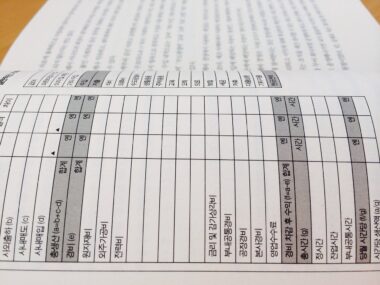Tips for Negotiating Better Payment Terms with Suppliers
Negotiating favorable payment terms with suppliers is critical to any business’s financial health. Start by understanding your cash flow needs and create a clear picture of your financial position. This information will serve as a strong foundation during negotiations. Try to establish a positive relationship with your suppliers by maintaining open communication. Showing appreciation for their services can lead to better terms. Assess your current financial situation to know how flexible your payment terms can be. Having this information helps you approach suppliers confidently. Make sure to conduct thorough research on industry standards for payment terms. Understanding what is typical enables you to ask for favorable terms that are still reasonable. When you present your case, be clear about your cash flow projections to justify your requests. Consider discussing volume discounts or early payment incentives. This can create a win-win scenario for both parties. Identifying key suppliers to negotiate with first will streamline your efforts and maximize effectiveness. Set clear objectives and be prepared to offer something in return for better terms, such as commitment or larger orders. Finally, always be ready to review and revise agreements to suit changing circumstances.
Listening actively during negotiations is crucial for understanding a supplier’s perspective. Knowing how to ask the right questions can help you unearth their willingness to negotiate. Ask about their constraints and flexibility regarding payment terms, and use this information to shape your proposals. Another effective strategy is to build rapport with suppliers while asserting your needs. Establishing common ground can help facilitate collaboration and lead to more favorable outcomes. Moreover, timing is vital; discuss payment terms when establishing a new contract or during an existing review. Present a discussion of terms as an opportunity for both parties, ideally when business is flourishing. When making requests, always frame them to demonstrate mutual benefit, such as improving your cash flow while ensuring timely payments to suppliers. After proposing new terms, be prepared for counter-offers and resist the urge to accept them immediately. Instead, discuss potential adjustments to frame the conversation positively. Use your market knowledge to back your requests, citing competitor terms or general industry trends as leverage. Adopting a professional yet assertive approach throughout this negotiation will also inspire confidence from suppliers and ensure a smoother discussion.
Building Strong Relationships with Suppliers
Building strong, trust-based relationships with suppliers can lead to easier negotiations in the long run. Maintaining open lines of communication demonstrates professionalism and respect, encouraging suppliers to engage with you willingly. Be proactive in establishing contact and remain courteous, even when it comes to discussing negotiation concerns. Regular check-ins can help reinforce this practice. Make sure to keep suppliers informed about your business developments, which can create trust over time. Positivity and mutual respect go a long way toward enhancing these relationships. Focus not only on the negotiation at hand but also on long-term collaboration. Foster goodwill by showing appreciation for their hard work and reliability. Be honest about any challenges you face, and encourage an open exchange of information that could benefit both parties. Make sure to show them that their timely delivery or product quality impacts your business success significantly. Once established, these relationships can lead to flexibility in terms for future negotiations. Don’t forget to follow up after negotiations are completed to thank suppliers for their contributions. Always express your enthusiasm for continuing to collaborate effectively with them moving forward.
Monitoring market trends is essential for effective supplier negotiations. Understanding these trends provides context for how your business position compares within the industry. This information can help you negotiate payment terms that are more favorable, as suppliers may be more open to discussing terms if they believe in your long-term viability. Regularly researching competitor relationships can offer valuable insights into standard payment practices. Analyze their agreements, ensuring you stay informed about what other businesses are successfully negotiating. Keeping tabs on economic indicators can help in making informed requests. For instance, rising inflation or shifts in supply chains may allow you to negotiate better terms or explore alternative suppliers. It can be helpful to use data analytics to understand purchase cycles and seasonal trends affecting cash flow. Prepare detailed financial forecasts that align with these trends to substantiate your requests. Assertiveness in negotiations becomes more credible when you can offer substantial information backing your proposals. Always approach discussions from an informed standpoint, emphasizing the benefits for both parties. This thorough approach not only boosts your credibility but also encourages suppliers to view you as a trusted, valued partner.
Maintaining Flexibility and Adaptability
Maintaining flexibility and adaptability during negotiations is paramount in achieving favorable outcomes. The business landscape is constantly changing and being adaptable allows you to respond to these changes more effectively. Be prepared to adjust your requests based on supplier feedback or market conditions. Listening actively not only provides you with valuable insight into suppliers’ positions but also demonstrates that you’re open to collaborative solutions. Tailor your proposals based on their needs as well, always indicating a willingness to find common ground. Consider alternative payment structures that might offer benefits to both sides, such as phased payments tied to project milestones. This gives suppliers reassurance while allowing you to manage cash flow more skillfully. Don’t hesitate to reassess your priorities frequently during discussions, as new information can lead to better focuses. Always aim for solutions that maintain a healthy relationship moving forward, while preventing tension from arising. If issues arise, take time to negotiate adjustments in the framework of an existing agreement instead of starting over from scratch. When adaptability becomes your negotiating staple, this will inherently lead to improved supplier relationships and more sustainable results.
In closing, effective negotiation of payment terms with suppliers is essential for thriving within your industry. Taking the time to research industry practices, develop rapport, and maintain flexibility provides a foundation for successful discussions. By understanding your cash flow and presenting a well-structured request, you can foster lasting relationships that yield more favorable outcomes. Remember that negotiations do not exist in isolation; they rely on the overall health of your business and the importance of the supplier’s role within that ecosystem. Be proactive and maintain open lines of communication throughout the negotiation process, ensuring that you express appreciation for their contributions. This approach fosters cooperation and can lead to better payment terms down the line. As you continue to manage and cultivate these relationships, your business can evolve towards greater financial stability. Always track the outcomes and feedback from each negotiation to enhance the skills you develop over time. Over time, you’ll build the confidence to tackle potential negotiation hurdles, ensuring your company thrives while continuing to maintain collaborative supplier relationships built on trust and respect.
Conclusion
In conclusion, mastering the art of negotiating favorable payment terms with suppliers can significantly impact your financial management endeavors. Implementing the strategies laid out, like establishing rapport and being informed, cements strong supplier relationships. Take advantage of every opportunity to enhance communication and ensure you demonstrate mutual benefit during negotiations. This interaction should feel like a partnership, where both parties strive for advantageous arrangements. Always reassess contracts regularly, adjusting terms as necessary to reflect changes in your business environment or supplier capabilities. Monitoring market trends and adapting to evolving dynamics is crucial for maintaining an agile business strategy. By employing these methods earnestly, over time, you’ll start seeing improvements not just in supplier relationships but also your overall profitability. Engaging with suppliers in a transparent manner is vital, as is recognizing the long-term benefits of these strong networks. By fostering trust and understanding, you and your suppliers can navigate uncertainties together, leading your business toward continued success. Make sure to apply these principles consistently so that negotiation evolves from a challenging process to a productive dialogue that fosters shared growth.
Ultimately, negotiating better payment terms requires a thoughtful, informed approach. Combining supportive relationships with flexibility and adherence to market trends enables you to pursue favorable outcomes continuously. Empathy should underpin all interactions, as your understanding can lead to win-win scenarios that enhance cooperation. The ability to adapt will serve as a tremendous asset in this process, ensuring that you evolve alongside your suppliers. Maintain a proactive approach and never underestimate the value of preparation. Treat every negotiation as a collaborative journey toward shared objectives and long-term success. By following these strategies, you position your business favorably in negotiations and foster solid relationships that endure changes over time. As your network of suppliers strengthens, the benefits will cascade throughout your financial management and overall business operations, leading to sustainable growth. Therefore, keep these tactics at the forefront of your financial management strategy and watch as you transform how you engage with suppliers. Over time, your negotiation skills will sharpen, and your business will thrive, solidifying your role as a trustworthy business partner in a competitive landscape.








